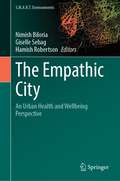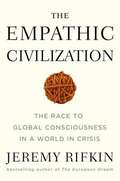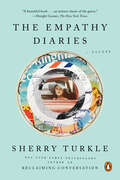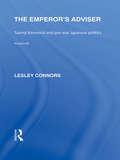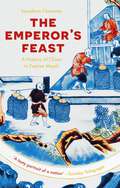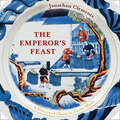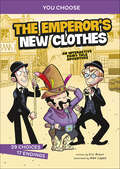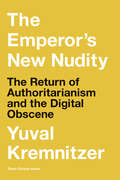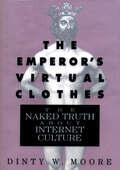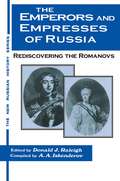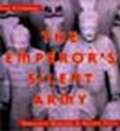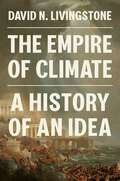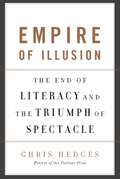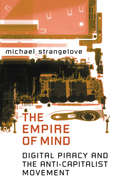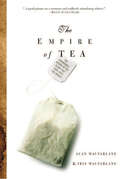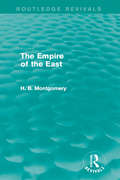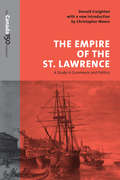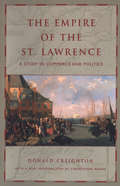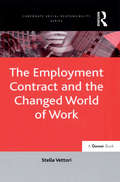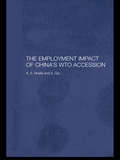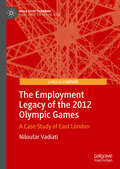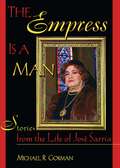- Table View
- List View
The Empathic City: An Urban Health and Wellbeing Perspective (S.M.A.R.T. Environments)
by Nimish Biloria Giselle Sebag Hamish RobertsonThis book has a primary focus on inclusions for solutions to problems and not just more on the nature of the current and emerging problems that most other competing titles present. The book is also a true global representation of challenges and opportunities that have been encountered, addressed, and critiqued from a wide variety of contributors rather than academicians per se. In doing so, rather than focusing on techno-centric prowess and associated case studies of the west (as is the case in most competing titles), the book also equally emphasizes upon the vulnerabilities and mitigating solutions being developed and tested in the under-developed and developing nations. Besides this, the book also acquires an ‘Equity’ oriented focus and hints upon sustainable, inclusive modes of shaping our built environment throughout the contributing chapters. The book is also unique in the way it combines the chosen themes to provide a holistic coverage of the broader determinants of urban health and wellbeing, thus being better positioned to address SDG3 within one compact volume. The book also differs from a typical conference proceeding or a non-peer reviewed book since the book’s highly theme specific approach is curated by a scientific peer review committee to carefully maintain diversity of contributions to the book. Cities have a profound power to support or hinder human health and wellbeing in countless ways. Achieving greater health equity has emerged in recent years as a key priority and consideration when designing cities to promote health and wellbeing, although there is a dearth of evidence and practical examples of research translation to guide cities and communities. The book accordingly exemplifies a pluralistic approach to achieving urban health equity which recognises and addresses critical aspects of geography, age, race, background, socioeconomic status, disability, gender etc. With interdisciplinary science clearly pointing to the role of the neighbourhood environment as one of the most important health determinants, this book will undoubtedly lead the next generation of urban health actors to build contextually responsive, equitable, empathic cities to benefit residents around the world. The book, rather than being focused purely on academic propositions for building equitable cities, offers a unique multi-stakeholder perspective by collaborating with the International Society for Urban Health’s 18th International Conference on Urban Health. This unique collaboration allows access to hundreds of scientists, architects, urbanists, multilaterals, policymakers, non-profit leaders, and grassroots organizers. The book captures the voices and concerns of such diverse cross-sectoral professionals and showcases findings that turn evidence into action and impact in communities around the world.Chapter 14 is available open access under a Creative Commons Attribution 4.0 International License via link.springer.com.
The Empathic Civilization
by Jeremy RifkinIn this sweeping new interpretation of the history of civilization, bestselling author Jeremy Rifkin looks at the evolution of empathy and the profound ways that it has shaped our development-and is likely to determine our fate as a species. Today we face unparalleled challenges in an energy-intensive and interconnected world that will demand an unprecedented level of mutual understanding among diverse peoples and nations. Do we have the capacity and collective will to come together in a way that will enable us to cope with the great challenges of our time? In this remarkable book Jeremy Rifkin tells the dramatic story of the extension of human empathy from the rise of the first great theological civilizations, to the ideological age that dominated the 18th and 19th centuries, the psychological era that characterized much of the 20th century and the emerging dramaturgical period of the 21st century. The result is a new social tapestry-The Empathic Civilization-woven from a wide range of fields. Rifkin argues that at the very core of the human story is the paradoxical relationship between empathy and entropy. At various times in history new energy regimes have converged with new communication revolutions, creating ever more complex societies that heightened empathic sensitivity and expanded human consciousness. But these increasingly complicated milieus require extensive energy use and speed us toward resource depletion. The irony is that our growing empathic awareness has been made possible by an ever-greater consumption of the Earth's resources, resulting in a dramatic deterioration of the health of the planet. If we are to avert a catastrophic destruction of the Earth's ecosystems, the collapse of the global economy and the possible extinction of the human race, we will need to change human consciousness itself-and in less than a generation. Rifkin challenges us to address what may be the most important question facing humanity today: Can we achieve global empathy in time to avoid the collapse of civilization and save the planet? One of the most popular social thinkers of our time, Jeremy Rifkin is the bestselling author of The European Dream, The Hydrogen Economy¸ The End of Work, The Biotech Century, and The Age of Access. He is the president of the Foundation on Economic Trends in Washington, D. C.
The Empathic Civilization: The Race to Global Consciousness in a World in Crisis
by Jeremy Rifkin"One of the leading big-picture thinkers of our day" (Utne Reader) delivers his boldest work in this erudite, tough-minded, and far-reaching manifesto. Never has the world seemed so completely united-in the form of communication, commerce, and culture-and so savagely torn apart-in the form of war, financial meltdown, global warming, and even the migration of diseases. No matter how much we put our minds to the task of meeting the challenges of a rapidly globalizing world, the human race seems to continually come up short, unable to muster the collective mental resources to truly "think globally and act locally." In his most ambitious book to date, bestselling social critic Jeremy Rifkin shows that this disconnect between our vision for the world and our ability to realize that vision lies in the current state of human consciousness. The very way our brains are structured disposes us to a way of feeling, thinking, and acting in the world that is no longer entirely relevant to the new environments we have created for ourselves. The human-made environment is rapidly morphing into a global space, yet our existing modes of consciousness are structured for earlier eras of history, which are just as quickly fading away. Humanity, Rifkin argues, finds itself on the cusp of its greatest experiment to date: refashioning human consciousness so that human beings can mutually live and flourish in the new globalizing society. In essence, this shift in consciousness is based upon reaching out to others. But to resist this change in human relations and modes of thinking, Rifkin contends, would spell ineptness and disaster in facing the new challenges around us. As the forces of globalization accelerate, deepen, and become ever more complex, the older faith-based and rational forms of consciousness are likely to become stressed, and even dangerous, as they attempt to navigate a world increasingly beyond their reach and control. Indeed, the emergence of this empathetic consciousness has implications for the future that will likely be as profound and far-reaching as when Enlightenment philosophers upended faith-based consciousness with the canon of reason.
The Empathy Diaries: A Memoir
by Sherry TurkleMIT psychologist and bestselling author of RECLAIMING CONVERSATION and ALONE TOGETHER, Sherry Turkle's intimate memoir of love and work <P><P> For decades, Sherry Turkle has shown how we remake ourselves in the mirror of our machines. Here, she illuminates our present search for authentic connection in a time of uncharted challenges. Turkle has spent a career composing an intimate ethnography of our digital world; now, marked by insight, humility, and compassion, we have her own. <P><P> In this vivid and poignant narrative, Turkle ties together her coming-of-age and her pathbreaking research on technology, empathy, and ethics. Growing up in postwar Brooklyn, Turkle searched for clues to her identity in a house filled with mysteries. She mastered the codes that governed her mother's secretive life. She learned never to ask about her absent scientist father--and never to use his name, her name. Before empathy became a way to find connection, it was her strategy for survival. <P><P> Turkle's intellect and curiosity brought her to worlds on the threshold of change. She learned friendship at a Harvard-Radcliffe on the cusp of coeducation during the antiwar movement, she mourned the loss of her mother in Paris as students returned from the 1968 barricades, and she followed her ambition while fighting for her place as a woman and a humanist at MIT. There, Turkle found turbulent love and chronicled the wonders of the new computer culture, even as she warned of its threat to our most essential human connections. The Empathy Diaries captures all this in rich detail--and offers a master class in finding meaning through a life's work.
The Emperor of All Maladies: A Biography of Cancer
by Siddhartha MukherjeeWINNER OF THE PULITZER PRIZEThe Emperor of All Maladies is a magnificent, profoundly humane "biography" of cancer--from its first documented appearances thousands of years ago through the epic battles in the twentieth century to cure, control, and conquer it to a radical new understanding of its essence. Physician, researcher, and award-winning science writer, Siddhartha Mukherjee examines cancer with a cellular biologist's precision, a historian's perspective, and a biographer's passion. The result is an astonishingly lucid and eloquent chronicle of a disease humans have lived with--and perished from--for more than five thousand years. The story of cancer is a story of human ingenuity, resilience, and perseverance, but also of hubris, paternalism, and misperception. Mukherjee recounts centuries of discoveries, setbacks, victories, and deaths, told through the eyes of his predecessors and peers, training their wits against an infinitely resourceful adversary that, just three decades ago, was thought to be easily vanquished in an all-out "war against cancer." The book reads like a literary thriller with cancer as the protagonist. From the Persian Queen Atossa, whose Greek slave may have cut off her diseased breast, to the nineteenth-century recipients of primitive radiation and chemotherapy to Mukherjee's own leukemia patient, Carla, The Emperor of All Maladies is about the people who have soldiered through fiercely demanding regimens in order to survive--and to increase our understanding of this iconic disease. Riveting, urgent, and surprising, The Emperor of All Maladies provides a fascinating glimpse into the future of cancer treatments. It is an illuminating book that provides hope and clarity to those seeking to demystify cancer.
The Emperor's Adviser: Saionji Kinmochi and Pre-War Japanese Politics (Routledge Library Editions: Japan)
by Lesley ConnorsSaionji Kinmochi was an aristocrat, a scholar and a progressive liberal politician who twice occupied the highest political office in the nation and who, during three decades, as adviser to three Emperors, coordinated and directed Japanese politics. His long life encompassed the emergence of the modern Japanese state, the establishment of the constitution, the integration of Japan into the inter-war, international community and the creation, and subsequent erosion of the democratic process. The story of his twilight years chronicles the conflicts between the goals of liberalism and internationalism which dominated Japanese politics in the 1920s and the right-wing militarism which held sway in the years leading to the Pacific War. He was a central figure in the turbulent, formative period of Japan’s political ideology.
The Emperor's Feast: 'A tasty portrait of a nation' –Sunday Telegraph
by Jonathan Clements'A galloping journey through thousands of years of Chinese culinary history . . . a timely reminder that the country's modern cuisine is the delicious fruit of a rich, ancient and perhaps surprisingly multicultural tradition' FUCHSIA DUNLOP, SPECTATOR'A tasty portrait of a nation' SUNDAY TELEGRAPH'A splendid introduction to the complex history of China' GUARDIAN'A terrific read . . . Jonathan Clements writes with erudition and humour' DAILY MAIL'This book is itself a feast, each chapter a sumptuous course'Frederik L. Schodt, author of My Heart Sutra'Witty and insightful' Derek Sandhaus, author of Drunk in China****************The history of China - not according to emperors or battles, but according to its food and drink.The Emperor's Feast is the epic story of a nation and a people, told through one of its most fundamental pillars and successful exports: food. Following the journeys of different ingredients, dishes and eating habits over 5,000 years of history, author and presenter Jonathan Clements examines how China's political, cultural and technological evolution and her remarkable entrance onto the world stage have impacted how the Chinese - and the rest of the world - eat, drink and cook.We see the influence of invaders such as the Mongols and the Manchus, and discover how food - like the fiery cuisine of Sichuan or the hardy dishes of the north - often became a stand-in for regional and national identities. We also follow Chinese flavours to the shores of Europe and America, where enterprising chefs and home cooks created new traditions and dishes unheard of in the homeland.From dim sum to mooncakes to General Tso's chicken, The Emperor's Feast shows us that the story of Chinese food is ultimately the story of a nation: not just the one that history tells us, but also the one that China tells us about itself.
The Emperor's Feast: 'A tasty portrait of a nation' –Sunday Telegraph
by Jonathan Clements'A galloping journey through thousands of years of Chinese culinary history . . . a timely reminder that the country's modern cuisine is the delicious fruit of a rich, ancient and perhaps surprisingly multicultural tradition' FUCHSIA DUNLOP, SPECTATOR'A tasty portrait of a nation' SUNDAY TELEGRAPH'A splendid introduction to the complex history of China' GUARDIAN'A terrific read . . . Jonathan Clements writes with erudition and humour' DAILY MAIL'This book is itself a feast, each chapter a sumptuous course'Frederik L. Schodt, author of My Heart Sutra'Witty and insightful' Derek Sandhaus, author of Drunk in China****************The history of China - not according to emperors or battles, but according to its food and drink.The Emperor's Feast is the epic story of a nation and a people, told through one of its most fundamental pillars and successful exports: food. Following the journeys of different ingredients, dishes and eating habits over 5,000 years of history, author and presenter Jonathan Clements examines how China's political, cultural and technological evolution and her remarkable entrance onto the world stage have impacted how the Chinese - and the rest of the world - eat, drink and cook.We see the influence of invaders such as the Mongols and the Manchus, and discover how food - like the fiery cuisine of Sichuan or the hardy dishes of the north - often became a stand-in for regional and national identities. We also follow Chinese flavours to the shores of Europe and America, where enterprising chefs and home cooks created new traditions and dishes unheard of in the homeland.From dim sum to mooncakes to General Tso's chicken, The Emperor's Feast shows us that the story of Chinese food is ultimately the story of a nation: not just the one that history tells us, but also the one that China tells us about itself.
The Emperor's Feast: 'A tasty portrait of a nation' –Sunday Telegraph
by Jonathan ClementsThe journey of Chinese food over 5,000 years of history - and the story it tells us about the land and its people.From the humble takeaway in the middle of a tiny English village to the embarrassment of riches offered in a big-city Chinatown, Chinese food is everywhere to be found. But the meals on offer merely scratch the surface of a rich and dizzyingly varied culinary tradition, spread across 5,000 years of history and over the more than thirty provinces and regions that constitute modern China - not to mention the Chinese diaspora communities all across the world.In The Emperor's Feast, author and TV presenter Dr Jonathan Clements invites us into the history of Chinese food, starting with the earliest grain stews and the rudimentary chopsticks of the Bronze Age and taking us through the development of dining etiquette under Confucius, the popularisation of rice and the dawn of the dumpling in the 4th century. We see how Chinese cuisine morphed and adapted to the eating habits of invaders such as the Mongols and the Manchus, and how food - like the heady, fiery cuisine of Sichuan or the hardy wheat-based dishes of the north - often became a stand-in for Chinese regional and national identities. Dr Clements then traces the journey of Chinese food to our modern Chinatowns and takeaways, from the tumultuous early days of the 19th century to the profound impact of the rapid industrialisation and globalisation of post-Mao China on the national diet. As we enter the 21st century with food scandals and a Guinness World Record attempt involving fried rice, The Emperor's Feast shows us that the story of Chinese food is inextricably entwined with the story of China: not only the one that history tells us, but also the one that China tells about itself.(P) 2021 Hodder & Stoughton Ltd
The Emperor's New Clothes: An Interactive Fairy Tale Adventure (You Choose)
by Eric BraunThe celebration is about to start. It's time to see the emperor's new...spacesuit? Join the party and go through three twisted versions of the classic fairy tale. Will YOU CHOOSE the path to your happily ever after?
The Emperor's New Nudity: The Return of Authoritarianism and the Digital Obscene (Short Circuits)
by Yuval KremnitzerAn analysis of contemporary authoritarianism and the medium in which it flourishes, the internet, as well as what lies at the complex intersection of authority and technology.In recent decades, a new style of authoritarian politics has taken hold throughout the liberal-democratic world. The new authority figures are characterized by obscene, transgressive behavior, reminiscent of the &“crowd&” leader as theorized by Freud, only far less transient. In The Emperor's New Nudity, Yuval Kremnitzer considers the fraught intersection of authority and technology—the internet being the medium that has allowed contemporary authoritarianism to thrive—asking foundational questions such as: How can we think of the network as a social phenomenon? What can social and political phenomena teach us about the nature of the new technology? And how does technology reshape the very fabric of social and political life?Technology, Kremnitzer writes, leads us toward an impersonal and hyperrational world to such an extent that it renders human subjectivity outmoded. Authority, on the other hand, anchors our subjective identifications to certain figures and seems to be hopelessly primitive and irrational. What is required, then, is a dialectics of the primal—a study of the way in which what strikes us as essential enters into the dynamics of historical change. From this perspective, authority and technology can be said to be divided by a common object—the unwritten law, and the special knowledge that pertains to it: a knowledge without knowers.
The Emperor's Virtual Clothes: The Naked Truth About Internet Culture
by Dinty W. MooreA skeptic by nature, a writer and teacher more at home with ballpoint pens than computer programs, Dinty W. Moore wanted to find out for himself if the much-touted Internet and the electronic culture it has spawned is really going to be the Next Big Thing, or whether it's the emperor's new clothes. This is not a how-to guide, a giddy net-head's online magical mystery tour, or a binaries-in-the-sky futurist treatise. Instead, this book tells it like it is about the Internet. Anyone who's asked, Who's there? What am I missing? and What is it all about? will find Moore's good-natured skepticism a welcome break from the explosion of wide-eyed techno-hype raging all around us. "Moore is far and away the best pure writer of the 'Wired School.' He's like the Stage Manager poking his head in around the set of 'Our Town.' Funny that it took the arrival of this commonsensical outsider to finally put a real human face on the digital world."--San Jose Mercury-News.
The Emperors and Empresses of Russia: Reconsidering the Romanovs (The\new Russian History Ser.)
by Donald J. Raleigh A.A. IskenderovSince glasnost began, Russia's most eminent historians have taken advantage of new archival access and the end of censorship and conformity to reassess and reinterpret their history. Through this process they are linking up with Russia's great historiographic tradition while producing work that is fresh and modern. In "The Emperors and Empresses of Russia", renowned Russian historians tell the story of the Romanovs as complex individual personalities and as key institutional actors in Russian history, from the empire builder Peter I to the last tsar, Nicholas II. These portraits are contributions to the writing of history, partaking neither of wooden ideologisation nor of naive romanticisation.
The Emperor’s Silent Army: Terracotta Warriors of Ancient China
by Jane O'ConnorDescribes the archaeological discovery of thousands of life-sized terracotta warrior statues in northern China in 1974, and discusses the emperor who had them created and placed near his tomb.
The Empire of Climate: A History of an Idea
by David N. LivingstoneHow the specter of climate has been used to explain history since antiquityScientists, journalists, and politicians increasingly tell us that human impacts on climate constitute the single greatest threat facing our planet and may even bring about the extinction of our species. Yet behind these anxieties lies an older, much deeper fear about the power that climate exerts over us. The Empire of Climate traces the history of this idea and its pervasive influence over how we interpret world events and make sense of the human condition, from the rise and fall of ancient civilizations to the afflictions of the modern psyche.Taking readers from the time of Hippocrates to the unfolding crisis of global warming today, David Livingstone reveals how climate has been critically implicated in the politics of imperial control and race relations; been used to explain industrial development, market performance, and economic breakdown; and served as a bellwether for national character and cultural collapse. He examines how climate has been put forward as an explanation for warfare and civil conflict, and how it has been identified as a critical factor in bodily disorders and acute psychosis.A panoramic work of scholarship, The Empire of Climate maps the tangled histories of an idea that has haunted our collective imagination for centuries, shedding critical light on the notion that everything from the wealth of nations to the human mind itself is subject to climate&’s imperial rule.
The Empire of Illusion: The End of Literacy and the Triumph of Spectacle
by Chris HedgesWe now live in two Americas. One-now the minority-functions in a print-based, literate world that can cope with complexity and can separate illusion from truth. The other-the majority-is retreating from a reality-based world into one of false certainty and magic. To this majority-which crosses social class lines, though the poor are overwhelmingly affected-presidential debate and political rhetoric is pitched at a sixth-grade reading level. In this "other America," serious film and theater, as well as newspapers and books, are being pushed to the margins of society.In the tradition of Christopher Lasch's The Culture of Narcissism and Neil Postman's Amusing Ourselves to Death, Pulitzer Prize-winner Chris Hedges navigates this culture-attending WWF contests, the Adult Video News Awards in Las Vegas, and Ivy League graduation ceremonies-to expose an age of terrifying decline and heightened self-delusion.
The Empire of Mind
by Michael StrangeloveWhere many critics see the Internet as an instrument of corporate hegemony, Michael Strangelove sees something else: an alternative space inhabited by communities dedicated to anarchic freedom, culture jamming, alternative journalism, and resistance to authoritarian forms of consumer capitalism and globalization. In The Empire of Mind, "Dr. Strangelove," the scholar Canadian Business referred to as the "acknowledged dean of Internet entrepreneurs" and Wired called "the Canadian guru of Internet advertising," presents the compelling argument that the Internet and new digital communication technology actually undermine the power of capital, producing an alternative symbolic economy.Strangelove contends that the Internet breaks with the capitalist logic of commodification and that, while television produces a passive consumer audience, Internet audiences are more active, creative, and subversive. Writers, activists, and artists on the Internet undermine commercial media and its management of consumer behaviour, a behaviour that is challenged by the Web's tendency toward the disintegration of intellectual property rights. Case studies describe the invention of new meaning given to cultural and consumer icons like Barbie and McDonald's and explore how novel modes of online news production alter the representation of the world as it is produced by the mainstream, corporate press.In the course of exploring new media, The Empire of Mind also makes apparent that digital piracy will not be eliminated. The Internet community effectively converts private property into public, thereby presenting serious obstacles for the management of consumer behaviour and significantly eroding brand value. Much to the dismay of the corporate sector, online communities are disinterested in the ethics of private property. In fact, the entire philosophical framework on which capitalism is based is threatened by these alternative means of cultural production.
The Empire of Tea
by Alan Macfarlane Iris MacFarlaneThis cultural, political, and social history of tea presents a &“fascinating picture of tea's impact on the lives of millions of people around the world.&” (Publishers Weekly) From Darjeeling to Lapsang Souchon, from India to Japan—a fresh, concise, world-encompassing exploration of the way tea has shaped politics, culture, and the environment throughout history. From the fourth century BC in China, where it was used as an aid in Buddhist meditation, to the Boston Tea Party in 1773, to its present-day role as the most consumed substance on the planet, the humble Camellia plant has had profound effects on civilization. Renowned cultural anthropologist Alan MacFarlane and Iris MacFarlane recount the history of tea from its origin in the eastern Himalayas and explains, among other things, how tea became the world's most prevalent addiction, how tea was used as an instrument of imperial control, and how the cultivation of tea drove the industrial revolution. Both an absorbing narrative and a fascinating tour of some of the world's great cultures—Japan, China, India, France, Britain, and others—The Empire of Tea brings into sharp focus one of the forces that shaped history. "A good primer on a resonant and endlessly stimulating subject.&” —Boston Sunday Globe &“A fascinating picture of tea's impact on the lives of millions of people around the world.&” —Publishers Weekly &“An absorbing read.&” —Kirkus Reviews
The Empire of the East: A Simple Account Of Japan As It Was, Is And Will Be (classic Reprint) (Routledge Revivals)
by H. B. MontgomeryThis book, first published in 1908, is a result of Helen Barrett Montgomery’s visits to Japan, and the way in which she experienced Japanese life and culture. This book thoroughly examines aspects such as religion, language, trade and education in Japan at the beginning of the twentieth century. This book will be of interest to students of Asian Studies.
The Empire of the St. Lawrence: A Study in Commerce and Politics
by Christopher Moore Donald CreightonOriginally published in 1937 as "The Commercial Empire of the St. Lawrence, 1760-1850" and re-issued in its present form in 1956, Donald Creighton's study of the St. Lawrence became an essential text in Canadian history courses. This, his first book, helped establish Creighton as the foremost English Canadian historian of his generation. In it, he examines the trading system that developed along the St. Lawrence River and he argues that the exploitation of key staple products by colonial merchants along the St. Lawrence River system was key to Canada's economic and national development. Creighton tells the story of the St. Lawrence empire largely from the perspective of these Canadian merchants, who, above all others, struggled to win the territorial empire of the St. Lawrence and to establish the Canadian commercial state. Christopher H. Moore, historian and Governor General Award winner, has written a new introduction to this classic text.
The Empire of the St. Lawrence: A Study in Commerce and Politics
by Donald CreightonOriginally published in 1937 as "The Commercial Empire of the St. Lawrence, 1760 - 1850" and re-issued in its present form in 1956, Donald Creighton's study of the St. Lawrence became an essential text in Canadian history courses. This, his first book, helped establish Creighton as the foremost English Canadian historian of his generation. In it, he examines the trading system that developed along the St. Lawrence River and he argues that the exploitation of key staple products by colonial merchants along the St. Lawrence River system was key to Canada's economic and national development. Creighton tells the story of the St. Lawrence empire largely from the perspective of these Canadian merchants, who, above all others, struggled to win the territorial empire of the St. Lawrence and to establish the Canadian commercial state. Christopher H. Moore, historian and Governor General Award winner, has written a new introduction to this classic text.
The Employment Contract and the Changed World of Work (Corporate Social Responsibility Series)
by Stella VettoriThe world of work has undergone major changes in the last two decades. This book examines these changes in their international context. It is argued that collective bargaining should no longer be viewed as the most important means of regulating the employment relationship. In the changed world of work such an approach is becoming less relevant. Instead, other means of protecting legitimate worker interests are explored. These include: an adaptation and extension of the general principles of the law of contract; a constitutional right to fair labour practices; and the pursuit of good corporate governance and corporate social responsibility. The conclusion is that these alternative means of addressing legitimate worker interests can play a valuable role in filling the vacuum left by the worldwide decline of trade unions.
The Employment Impact of China's WTO Accession (Routledge Studies on the Chinese Economy #Vol. 7)
by A. S. Bhalla Shufang Qiu S. QiuThe book explores the macroeconomic and sectoral employment implications (in agriculture, industry and services) of China's World Trade Organisation accession. It argues that while short-run employment losses may occur, in the longer term China will be able to generate additional employment particularly in the tertiary sectors; and that it can maintain its comparative advantage in labour-intensive exports by relocating production from high-cost coastal areas to the hinterland with abundant supply of cheap labour.It also argues that, although China is likely to benefit in the long run, in the short and medium term China is likely to face enormous problems, including increased unemployment as weaker links cease to be protected by tariffs, and the problem of restructuring state-owned enterprises.
The Employment Legacy of the 2012 Olympic Games: A Case Study of East London (Mega Event Planning)
by Niloufar VadiatiThis book offers a detailed account of the employment promises made to local East Londoners when the Summer Olympic Games 2012 were awarded to London, as well as an examination of how those promises had morphed into the Olympic Labor market jamboree from which local communities were excluded.Regarding the global job market of London, this study provides a nuanced empirical view on how the world’s biggest mega event was experienced and endured in terms employment by its immediate hosts, in one of the UK’s poorest, most ethnically complex, and transient areas. The data has been collected through ethnographic observation and interviews with local residents, and expert interviews with the Olympic delivery professionals. Using Bourdieusian theory of contested capital, the findings provide an important bearing on the reproduction of inequality in the local labor markets of Olympic host cities.
The Empress Is a Man: Stories from the Life of José Sarria
by Michael R GormanYou may be familiar with the tremendous life achievements of José Sarria, an integral player in the gay rights movement, but never before have you heard the intimate details of his incredible life as they are portrayed here. In The Empress Is a Man: Stories from the Life of José Sarria (winner of the Lammy Award in the transgender category), Michael Gorman exposes Sarria’s life in a frank manner and with a unique storytelling ability that simultaneously causes amusement and sadness. Sarria’s amazing life story tells of his perserverance to advance the cause of equality for gay citizens.At a time when gays were arrested, institutionalized, and castrated, Sarria did not try to hide his beliefs and convictions. Sarria was ahead of his time, becoming a significant figure in gay history and culture. You’ll find The Empress Is a Man fascinating as you read about the life of this truly courageous, outrageous, and remarkable man. Some of Sarria’s experiences and achievements you’ll read about include: being the first openly gay male to run for political office being one of America’s most important female impersonators entertaining throughout the world, live and on film postitively affecting the gay community founding an extremely successful charity fundraising organization being featured in a PBS documentary serving in the Army in The Battle of the Bulge in WWIIUntil recently, gay and lesbian stories were published in very limited venues and often at great personal risk, forcing knowledge of this history to be passed down orally. The Empress Is a Man reflects this tradition by telling much of the story in Sarria’s own words. Adding to the enjoyment and originality of this book is a structure similar to the dramatic style of a play or novel. Each section ends with an exciting climax, although the book is chronological in order. The Empress Is a Man is an untraditional book about an untraditional man.
